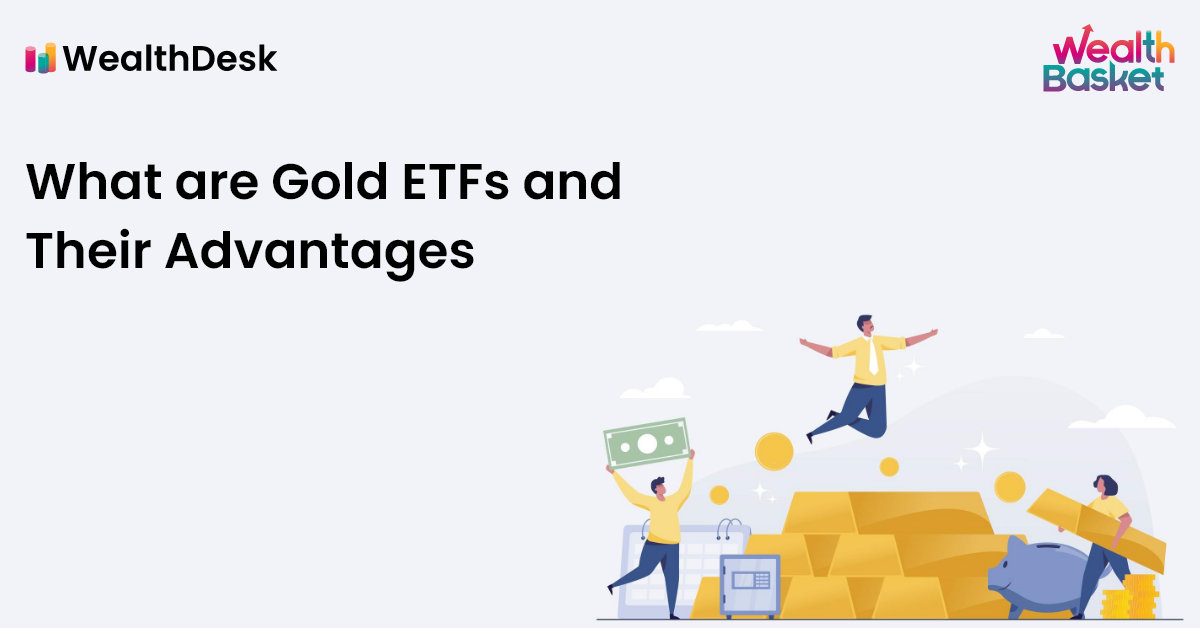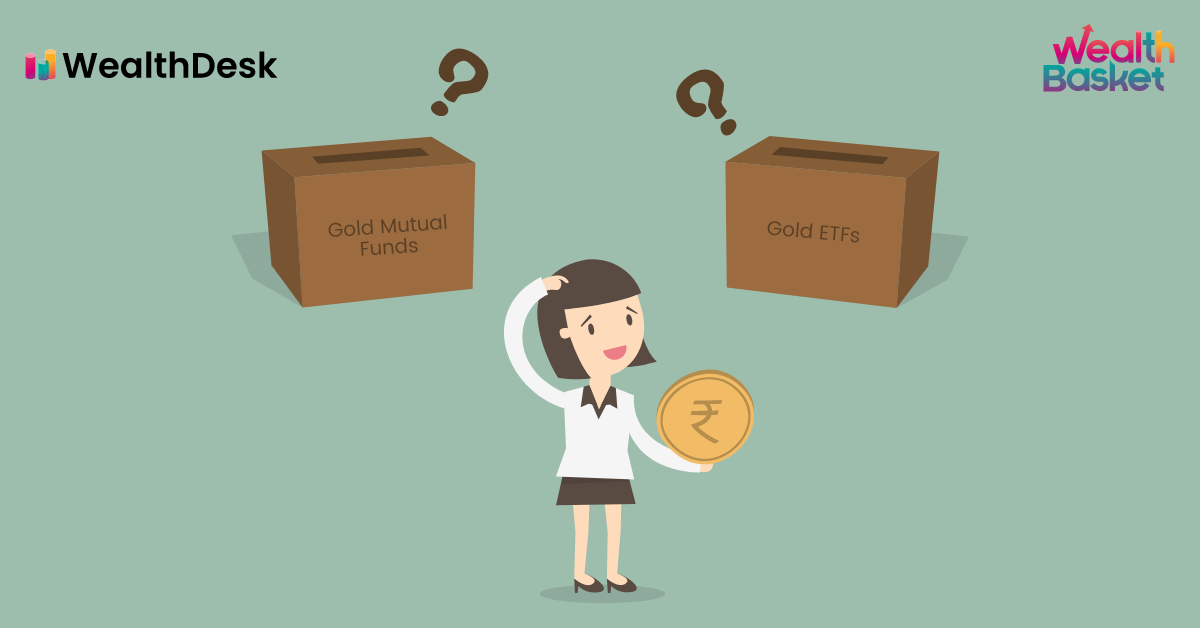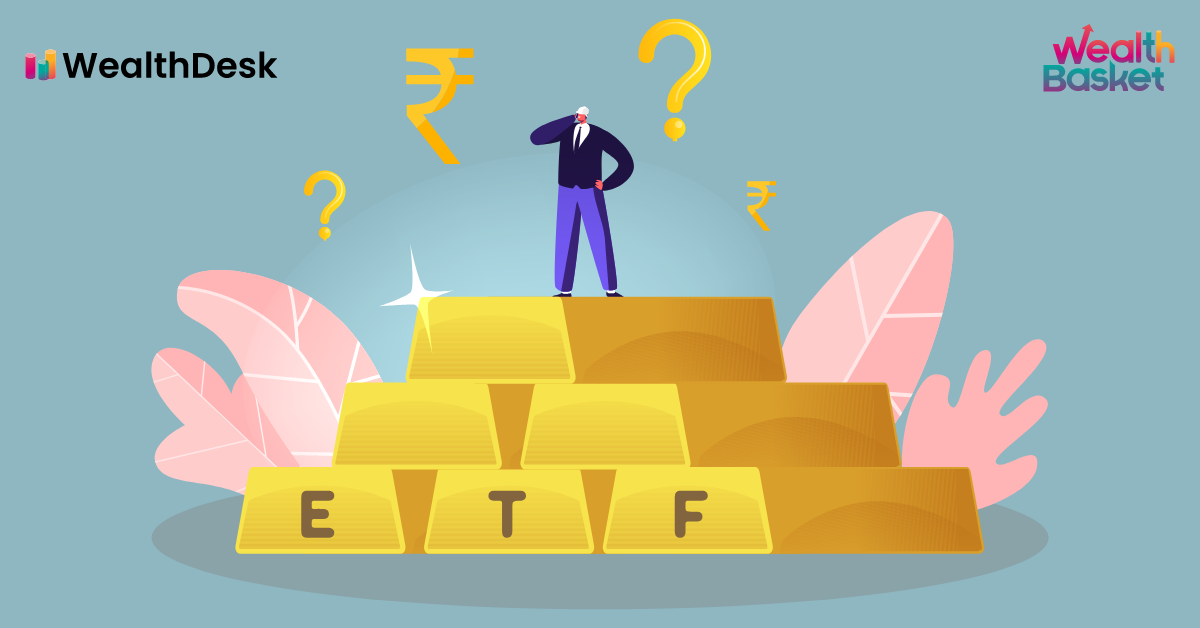Mr. Somasundaram PR, Regional Chief Executive Officer of WGC’s Indian operation predicts a rise in gold consumption in India up to an extent of 800-850 tonnes in 2022, which will be the highest rise in the past six years. The prediction signals the right time for gold investments. But holding physical gold is risky, and its storage is expensive.
The alternative is gold exchange-traded funds.
Here’s a blog that answers all queries about how to trade gold ETF in India, and covers all topics from what is gold ETF in India, what has been gold ETF performance in India, and what are the advantages of Gold ETFs, keeping in view the details of gold ETF returns.
What is Gold ETF in India?
Gold ETFs are basket investments that invest in gold bullion and track the domestic gold rates. Gold ETFs are an electronic form of gold with a 99.5% gold purity backing that is an excellent alternative to actual physical gold investment.
Small investors can invest in gold exchange-traded funds because the minimum requirement is one unit, whose value is one gram of gold. If you are in doubt concerning how to trade in gold ETF in India, you must know that they trade on the stock exchanges enabling investors the exposure to gold as they continue to deal in the market. ETFs may be bought and sold at the stock exchanges like the NSE and BSE.
Gold ETF Returns
Gold ETF Returns are the earnings or revenue from the ETFs. The varying risks make it challenging for Investors to find suitable gold exchange-traded funds, and return on gold ETFs are instrumental in guiding their decision.
You can protect yourself against a market drop with the finest gold ETFs in India, as mentioned below:
| Gold ETFs | 1 Year Return as of 23rd Feb 2022 | 5 Years Return as of 23rd Feb 2022 |
| Invesco G-ETF | 1.4% | 9.81% |
| HDFC Gold ETF | 7.80% | 10.03% |
| UTI-Gold ETF | 0.79% | 9.57% |
| Nippon ETF Gold | 6.41% | 10.03% |
| Axis Gold ETF | 7.08% | 10.08% |
| IPRU Gold ETF | 7.07% | 9.91% |
| Kotak MF-GETF | 7.04% | 10.19% |
| Birla Gold ETF | 7.09% | 10.25% |
Gold ETF Performance
For example, by investing in actual Gold, Invesco India Gold Exchange Traded Fund strives to deliver returns that closely match those provided by the price of gold. From its launch on 12th March 2010 to the present, the gold ETF return is 8.65% at the expense of 0.55%. It tracks the domestic gold rate index and has amassed assets worth INR 77 Cr.
How to Trade Gold ETF in India?
Follow the steps to trade in Gold ETFs:
- You will need to create a Demat account to trade in gold exchange-traded funds.
- On the BSE/NSE, an investor can buy gold ETFs through a broker, utilizing a Demat and trading account.
- Investors may also buy gold ETFs on an internet platform through a broker if they have a Demat and trading account.
- When purchasing or selling gold ETFs, you’ll have to pay a brokerage fee as well as a modest fund management fee, if applicable.
Gold ETF Benefits
Gold ETFs are open-ended securities that invest in conventional gold bullion (99.5 percent purity). The market price of actual gold determines the value of units of an ETF, and the benefits of ETFs are as follows:
Liquidity
Gold exchange-traded funds trade on stock markets and are highly liquid in the sense that they can be converted into cash, whenever you need them. You just need to sell them, and you do not need to follow any lock-in period.
Flexibility
Gold ETFs may be purchased and deposited online in your Demat account. The asset management firm (AMC) trades them on a stock exchange, and you can enter or exit whenever you choose. Gold ETFs function similar to actual gold, even in the Demat format.
Trade-in Small Denominations
Gold ETFs are a cost-effective solution for investors because they can buy or sell a minimum of one unit equal to one gram of gold.
Reasonable
Because there is no entry or exit restrictions for gold ETFs listed on the stock exchange, there is no fee for purchasing or selling units. However, investors will have to pay the brokerage cost.
Hassle-Free Holding
There is no risk of theft because a Demat account holds units electronically. Investors can save on safety deposit locker charges, which they would need to pay for safe holding physical gold.
Cheaper than Physical Gold
While buying gold, the making charges, wealth tax, and VAT will make the purchase costlier by up to 20% to 30% of the total gold jewelry value. But gold exchange-traded funds that invest in gold could have a 1% cost ratio and brokerage fees of 0.5 percent or less.
Well-diversified
Gold exchange-traded funds (ETF) are fantastic to diversify your investment portfolio. During market uncertainty, a change in the portfolio might provide you with much better returns while reducing the market risks.
Real-time Trading
The gold ETF prices are updated and traded in real-time, similar to how stocks trade on the stock exchange.
Tax-efficient
Wealth tax does not apply to Gold ETFs. However, earnings from a short-term investment (sold before three years) attract income tax at the investor’s income tax bracket rates. If the investors sell them after three years of purchase (long term) with indexation benefits, it will attract 20.8 percent (including cess).
The Bottom Line
According to financial experts, gold should account for
10% to 20% of an investment portfolio. Gold exchange-traded funds
help diversify a portfolio while serving as a buffer
against inflation, currency risk, and market
volatility.
You can also pick baskets of ETFs
already created by industry professionals. At
WealthDesk,
SEBI-approved investment professionals have made
WealthBaskets
that consist of stocks or ETFs reflecting an investment
strategy or theme.
FAQs
While buying actual gold is complex or costly, investors can diversify their portfolios by investing in gold ETFs. Gold is a secure asset, meaning that its values are rarely erratic.
Physical gold may be less liquid, more complex, or expensive to sell. ETFs that track gold can be more fluid and cost-effective, particularly when such ETFs have an expense ratio as low as 0.20 percent.
If the Gold ETFs hold gold or gold futures contracts, there are no dividend yields. But gold ETFs that invest in the stocks of the firms involved in gold mining may pay dividends.

















